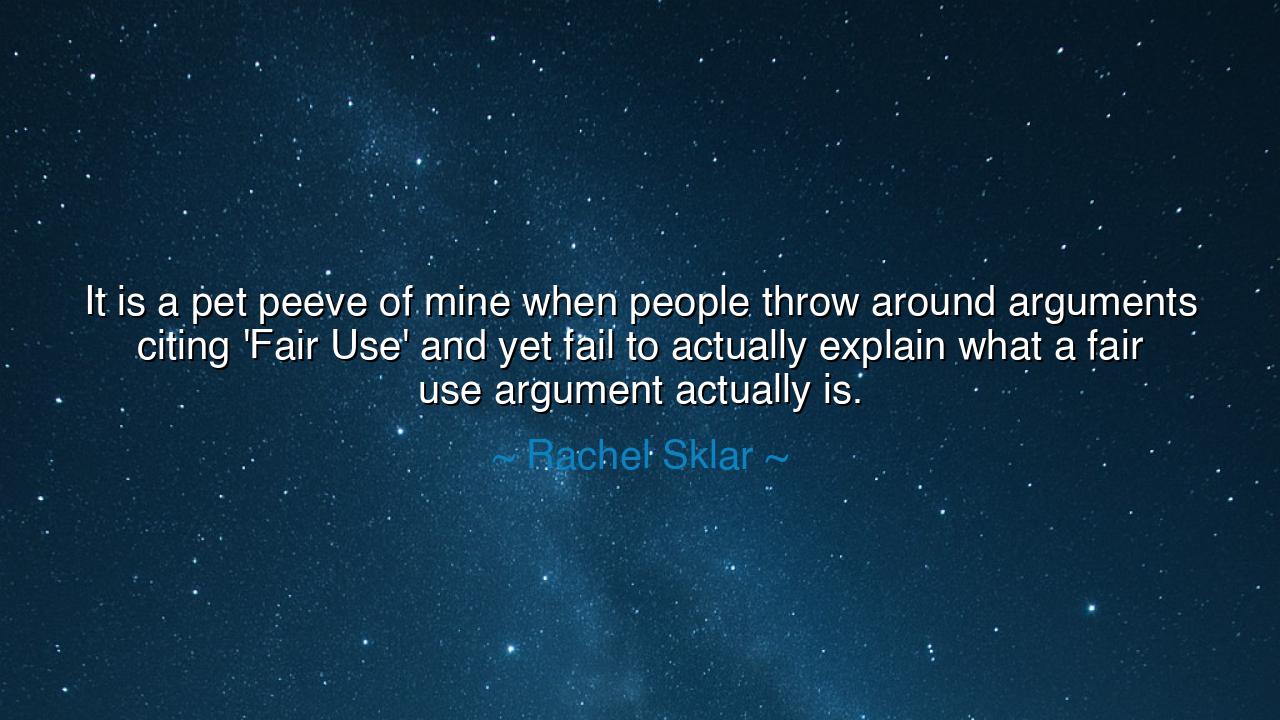
It is a pet peeve of mine when people throw around arguments
It is a pet peeve of mine when people throw around arguments citing 'Fair Use' and yet fail to actually explain what a fair use argument actually is.






Rachel Sklar declared with clarity and righteous frustration: “It is a pet peeve of mine when people throw around arguments citing ‘Fair Use’ and yet fail to actually explain what a fair use argument actually is.” At once sharp and wise, her words strike against the emptiness of careless speech. For it is a failing of mortals, both ancient and modern, to invoke great principles without understanding them, to brandish terms like weapons without knowing their weight. Her warning is not only about Fair Use in law, but about truth itself: never wield a word you have not first mastered, lest you dishonor both yourself and the cause you defend.
The ancients themselves wrestled with such folly. In the Agora of Athens, men would often shout of justice, freedom, or virtue, yet when Socrates asked them to define these words, they faltered. They loved the grandeur of the sound but not the discipline of the meaning. In the same way, Rachel Sklar laments that many cry out “Fair Use!” without knowledge, like soldiers charging with empty swords. The phrase, meant to guard the balance between creation and freedom, becomes weakened when used in ignorance.
To understand Fair Use is to walk a path of wisdom. It is not a blanket shield, nor a license for theft. It is a principle forged to ensure that knowledge, art, and culture may be shared for teaching, commentary, and growth without destroying the rights of the creator. To invoke it rightly is an act of balance, a recognition of the tension between protection and freedom. But when one speaks it without knowledge, one desecrates the very foundation of the principle. Sklar’s anger arises because ignorance cloaked in confidence corrupts the debate, leading others astray and turning noble ideals into hollow echoes.
History offers an example. When Johannes Gutenberg gave the world the printing press, voices rose in fear and protest. Some cried that the spreading of books would ruin the authority of scribes and scholars. Others invoked lofty words about knowledge belonging to the people. Yet many who shouted had no deep understanding of the rights of authors, the responsibilities of readers, or the structures of law. Confusion reigned, and it took centuries of careful thought and governance to establish laws protecting both the author and the common good. Even now, in the age of the internet, we fight the same battles. Sklar’s words remind us that shouting principles without understanding them is to repeat the errors of the past.
What, then, is the deeper lesson? It is this: do not wield words like banners if you have not studied their meaning. Do not invoke the sacred principles of law, philosophy, or faith without reverence and understanding. For words are not mere sounds—they are vessels of truth, forged through centuries of struggle and sacrifice. To misuse them is to dishonor the generations who labored to give them form.
Therefore, let the wise be diligent. When you argue, know the ground upon which you stand. If you speak of Fair Use, learn its pillars: the purpose of use, the nature of the work, the portion used, the effect upon the market. When you speak of justice, study what the philosophers taught, what the martyrs died for, what the laws command. When you speak of freedom, remember its cost in blood and sacrifice. Only then will your words carry the weight of truth, rather than the hollowness of noise.
Practical action shines clear: before you invoke a principle, pause. Ask yourself: Do I truly understand it? Could I teach it to another? If not, seek knowledge before speech. Read, study, and learn—not for pride, but for clarity. And when you speak, do so not with empty passion, but with informed conviction. In this way, your voice will not be lost in the clamor, but will stand firm, like a pillar carved from stone.
Thus Rachel Sklar’s complaint becomes eternal wisdom: Do not cast about mighty words without the anchor of knowledge. For words untethered are like ships without rudders, drifting into storms. But words grounded in truth become vessels of change, carrying both speaker and listener safely through the seas of debate, toward the shores of understanding.






AAdministratorAdministrator
Welcome, honored guests. Please leave a comment, we will respond soon